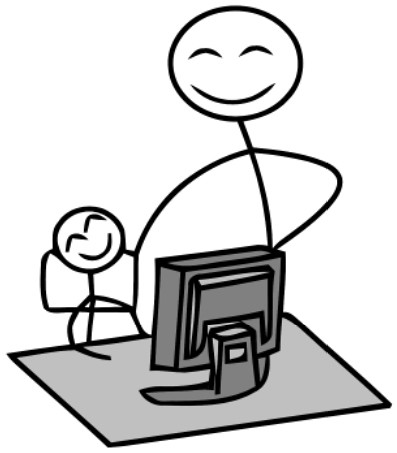 |
| CC image by Guudmorning via flickr |
As a one-to-one laptop school, and as an ecologically-minded person, I find that I am using technology more and more in my classroom. Students do much more writing within Google docs or Word documents than with pencil on paper. For example, at the beginning of our last writing unit as we were generating poems, I gave students the option to have an online writer's notebook using a Google doc which they shared with me, or to use their paper notebook. In one class I had a 100% online notebook return, and in the other, it was over 80%. Grades and homework are posted online for students to access whenever they want. Students email me with projects attached or when they have questions. Students are very comfortable with technology, I am loving the ease of feedback, and we are all saving a lot of trees in the process. Lots of wins!
As a one-on-one laptop school, we spend a lot of time guiding students on making good choices while using technology. We have lessons on multitasking vs. "single tabbing", using time productively, evaluating the source of information, detecting bias, how to cite sources for information and images, and note-taking and paraphrasing to avoid plagiarism. But one thing we don't do in eighth grade is talk about writing emails.
A few days ago, during spring break, I received this email from a student:
"How come my grade didn't go up after the revolutionary war test even though it was sumitive [sic].
I got a 83 on my first test and a 93 on my second shouldn't my grade be like 89"
That was the whole thing. There was no subject in the subject box, no greeting or closing, no spell check or editing for mechanics or grammar.
 |
| CC image by CollegeDegrees360 via flickr |
I was a bit taken aback by the tone of this email, although I'd gotten others like it throughout the years. I read it to my (non-teacher) friend who I was visiting at the time, and she was shocked at the rudeness. She suggested that I write back with an instructive or corrective message, something like "I will answer your question when you can address me with respect." That was certainly tempting.
Instead, I thought about what it was that bothered me about this email. Here's what I came up with:
- Tone: The student did not adjust his writing style to reflect his audience. The casual tone of this email reflects the way he talks to his friends, and is the kind of writing he does in a quick message. I am not his friend; I am his teacher. I expect a more formal tone.
- Structure: The lack of subject, greeting, and closing make this email feel aggressive and angry. When writing a letter, especially to someone in authority, it is customary to include formal structures and social niceties.
- Care: This student obviously wrote this email in a hurry and sent it off. He did not take the time to edit or re-read before sending. This shows how little thought he put into the message, that he did not really care whether the message reflected the level of concern with which he intended it, and that he didn't consider that his reader deserves to read a well-edited message.
- Misunderstanding: This student does not really understand how the grading system works. Yes, the two tests he is talking about are summative, and therefore go into the same category in the grading system (weighted 65% of the total grade). However, the first test was 83 points out of 100, and the second was 18.5 points out of 20. Since one has 5 times the number of points, it also has 5 times the weight on the grade. If I took 30 seconds to tell him this, he would probably say, "Oh, OK" and move on. However, if he actually looked at the grade book, he could figure this out himself. Instead of taking the time to do this, though, he would rather shoot a quick email to his teacher to get it sorted out.
The student is an eighth grade boy, a category of humans well known to be impulsive. He lives in a world where quick text messages and quick queries yield quick satisfactory answers. As a person, I know him to be a hard worker, a thoughtful friend, respectful of adults, and generally a nice boy. O don't think he intended to be rude; it just happened. So rather than sending a reprimand, I think I should view this as a little teachable moment for me.
I never established my expectations for how to address a teacher in an email at the beginning of the year. I never taught the required structure or tone. Although I give instructions like, "Use academic language" when blogging or during tests (and have explained what I mean by that phrase), I never applied that to email messages. If this is a battle I want to take on, I should approach it in a serious manner, teaching the conventions of email messages to adults just like I teach the conventions of essays or poetry. In the best case scenario, I should do this at the beginning of the year when all class routines are established. However, even now, I can teach it with an eye toward high school: "Your high school teachers will expect you to address them in a formal way when you write to them. It's important for you to practice this skill now so that it becomes a habit that will carry you through high school, onto college, and even into the workplace."
And I should also review how the grade book works, as well as how to see how the grades are calculated (there is a .pdf report option that shows how the grades work out). This will calm students down and help them see where the magical percentage number comes from.
In the fast pace of our lessons, I often get attachments without messages, or at most, "Here's my project. Hope you like it! :-)" I haven't worried about it in the past. I'm not going to go on an email rampage with my students now. However, it is a life lesson worth teaching, and obviously most students need to learn it, not just this one. And if I don't teach it, who will?
I am forwarding this to my 8th grade boy! Thinks "thank u for the bday gift" is ok for grandparents.
ReplyDelete